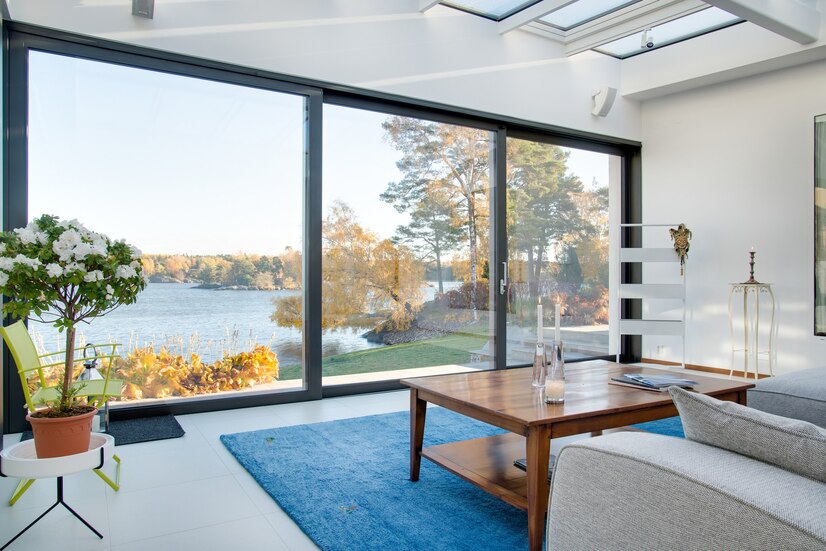The world will turn to more environment-friendly approaches. It demands sustainable building materials to rise in the world. This trend is also seen in the Architecture industry. Builders, contractors, Architects, and developers are following sustainable practices, use Aluminium Doors and Windows Systems, and reduce environment impact, and give long terms savings solutions to property owners.
One famous material that stands out is aluminum. Aluminum is used widely for doors and window systems in homes. It plays great importance in sustainable architecture. If you want to look at the Importance of Aluminium Systems and know how they contribute to a greener environment, then here is a blog for you.
Aluminum Systems: The Sustainable Architectural Solutions
Aluminum doors and windows are energy-efficient systems. It means they contribute to reduce the energy amount used in homes, offices and commercial spaces. The Aluminium Systems for Sustainable Architecture are excellent insulation properties, that keep temperature consistent and prevent heat to escape during winter. It also helps to block heat from entering in summer. It reduces energy consumption and also reduces the need for costly cooling and heating systems.
Moreover, the frames of Aluminum are thinner than other materials. This property allows the larger glass panes to be used. It enhances natural light to enter in space, and reduce need of artificial light in day. It reduces energy usage. By choose Aluminum systems, you can reduce energy bills, and carbon footprint. Using Aluminum doors and windows also contributes to sustainable architectural world.
Benefits of Aluminium Doors and Windows
Aluminium systems are the famous choice for sustainable architectural practices, because of various reasons. Let us look at the given benefits to understand the Importance of Aluminium Systems.
Aluminum is Lightweight
The most desirable feature of aluminum is that it is lightweight. By using aluminum in doors and windows, few materials support the load, and reduce material costs, without compromise quality and robustness. This feature make this best material for streamline installation process, and reduce resource usage.
In terms of sustainability, the lightweight feature of Aluminium contributes to less fuel resource usage and reduces carbon emissions. It also demands less energy for cooling, heating, and controls over climate.
Energy Efficiency
Another benefit of using Aluminium Systems for Sustainable Architecture is energy efficiency. The Aluminium doors and windows are well designed with the latest technology and enhance insulation properties. For example, Aluminium doors are easily fitted with double glazing and thermal breaks, and prevent heat loss in winter. It also reduces heat gains in summer. These energy-efficient features reduce energy bills and carbon footprint. It makes these materials important for sustainable architecture.
Recycling
The Aluminium is 100 % recyclable material, and give you benefits by reducing environmental impact. This feature conserves natural resources and saves energy. It save energy by reduce need to use new Aluminium everytime. So, reusing and recycling of Aluminium reduces the environmental footprint and makes a greener environment.
Adaptability to Climate Variability
Buildings are required to withstand extreme temperatures and weather conditions, especially during climate changes. So, the Aluminium Doors and Windows Systems give the inherent resilience to environmental stressors such as heavy rainfall, high winds, and temperature extremes. Their stability and structural integrity make it well suitable for climate-resilient building designs that focus on occupant comfort and safety.
Low Maintenance
The Aluminium Systems for Sustainable Architecture are highly reliable and durable materials that require less maintenance. It enhances the sustainability credentials. As we know, the traditional building materials such as steel or wood requires extensive painting, but Aluminium do not require extensive painting.
Aluminum systems do not require frequent maintenance and keep their top performance. It reduces the use of harmful chemicals and extends its lifespan. It controls over consumption of resources over time.
Improve Indoor Air Quality and Health Benefits
The another benefit of Aluminium Doors and Windows Systems is that it contribute to healthier indoor air. It do not release toxic materials and chemicals in air, and improve indoor air quality. This quality also contributes to sustainable architectural practices.
This is the reason why Aluminium doors and windows are used in sustainable building designs, where the top priority is the safety of occupants. The Aluminium systems are resistant to mildew or mold and thrive easily in humid environments. This resistance improves indoor air quality prevents contaminants and allergens from affects workers health.
Conclusion
Importance of Aluminium Systems do not only aims to reduce environmental impact, but also give you greener solutions for future. Aluminum is a reliable material for buildings and industries because of its energy efficiency and recycling properties.
This material improves recycling rates and optimizes the manufacturing process. It also results in reducing the environmental impact of aluminum. So, Aluminium plays vital role in green buildings, increases in demand, and emerges as key player in sustainable building materials.




